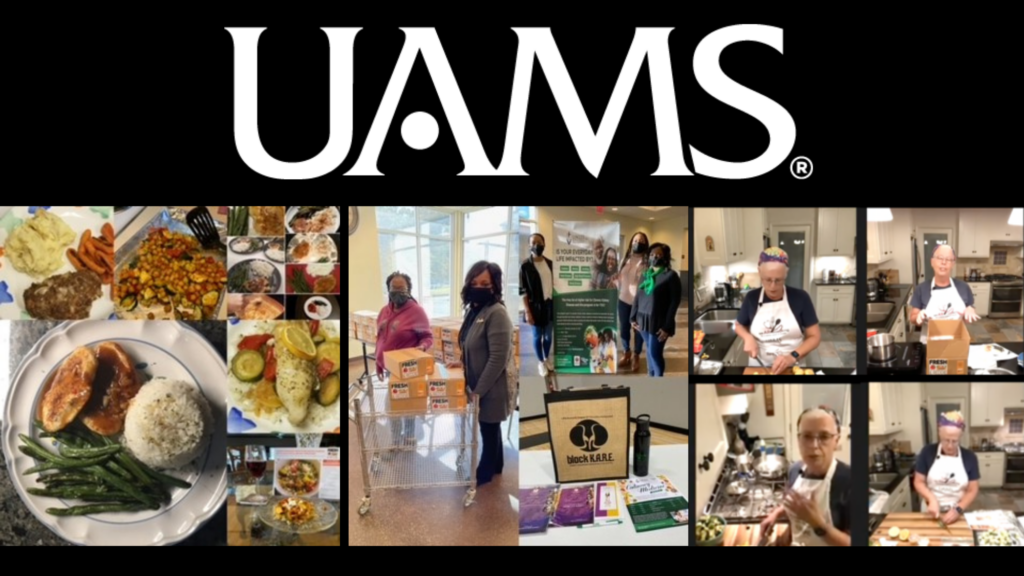
By Kalee Sexton
The culinary medicine team at the University of Arkansas for Medical Sciences (UAMS) recently partnered with the Little Rock Chapter of The Links, Inc., and Black Kidney Awareness Resource and Education (KARE) to educate people about chronic kidney disease and prevention.
Black KARE is a program grant funded by Baxter Pharmaceutical to raise awareness about chronic kidney disease (CKD) in Black communities. The Little Rock Chapter of The Links, Inc., organization is a group of professional Black women linked in friendship working together to improve their communities.
CKD is a condition in which kidney function decreases, causing the organs to be unable to filter blood as well as they should. It develops over time and is divided into five stages. Patients in the first four stages can take steps to stop the disease from getting worse while patients in the last stage experience complete kidney failure and require dialysis. Diabetes and high blood pressure are the leading causes of kidney failure.
The culinary medicine team and the Fresh & Reddie program at UAMS worked with the Little Rock Chapter of The Links, Inc., to provide four weeks of boxed meals to 75 participants from Longley Baptist Church and surrounding communities. The UAMS Culinary Medicine program’s registered dietician, Margaret Pauly, hosted Zoom cooking classes in November and December to teach the participants about the role nutrition plays in preventing chronic kidney disease.
Gloria Richard-Davis, M.D., MBA, executive director for UAMS’s Division for Diversity, Equity and Inclusion and the program director and lead instructor for the culinary medicine program, said the program helped patients understand food as medicine to prevent and control chronic disease.
“The program empowered patients with nutrition knowledge, resources and self-advocacy,” she said.
The Centers for Disease Control and Prevention estimates that about 37 million Americans have chronic kidney disease, many of whom are unaware because symptoms aren’t usually present until later stages. Black Americans are almost four times more likely to develop kidney failure than white Americans. Although Black Americans make up 13% of the population, they account for 35% of people with kidney failure in the United States. In Arkansas, the overall prevalence of the disease is 4%, but among Black Arkansans, the rate is 4.8%.
This health disparity is caused by several factors, including the fact that Black patients experiencing CKD are less likely to be identified as kidney transplant candidates than white patients.
When diagnosing patients with the disease, doctors calculate the estimated glomerular filtration rate (eGFR), which measures kidney function. Higher numbers, like 90 and above, indicate less advanced disease, while lower numbers indicate more severe damage. The eGFR is used to refer patients for transplant. Sometimes, race is used as a factor when calculating the eGFR. Most hospitals no longer factor in race because the result can make it seem like Black patients have better kidney function than they do. However, the race multiplier has hindered Black patients from proper care and treatment, allowing the disease to progress.
The two main causes of kidney disease, high blood pressure and diabetes, are also more prevalent in the Black community. Both conditions can be managed through exercise and nutrition, which is the message Black KARE and the culinary medicine team articulated through their program by providing heart-healthy, nutritious meals containing lean protein, fresh vegetables and reduced sodium.
Richard-Davis said several participants expressed that the program gave them the knowledge they needed to improve their health. One said she had previously been diagnosed with diabetes but was never referred to a registered dietician, so she was able to learn how to take care of her health and how food can make a difference.
By educating participants, UAMS hopes to raise awareness about health care disparities regarding CKD and help Black patients live longer, healthier lives, said Richard-Davis.
